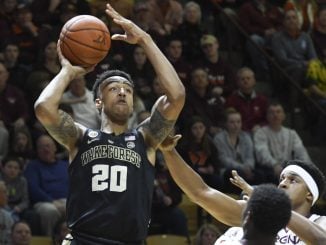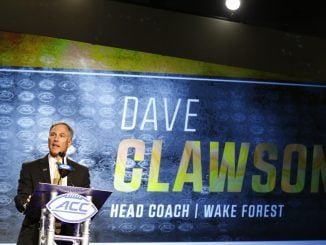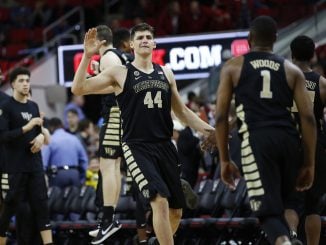RALEIGH — It’s easy to assume that someone who was a member of the best team ever would take being named to the North Carolina Sports Hall of Fame in stride. However, Curtis Strange was moved by the honor.
“I didn’t know truly what to expect,” he said. “Being here, around the athletes, meeting a lot of them for the first time and hearing their story, it was humbling. There’s so many good people in this world, coming off that stage where they performed, what little I did on it, what little I did in the game of golf, it just doesn’t compare to what they did.”
Strange was downplaying his golf accomplishments by more than a bit. The 2007 World Golf Hall of Famer had 29 pro wins, including 17 on the PGA Tour. He was back-to-back U.S. Open champion in 1988 and 1989 and the PGA Player of the Year in 1988, which was also the third season in which he led the tour in prize money earned.
Strange was also reluctant to take his place in the golf history of his alma mater, Wake Forest.
“I’m officially joining a very select group,” he said at his induction to the North Carolina Sports Hall in April, “including Arnold Palmer — I’ve talked a good bit about him. To officially join up with men like him … it’s something you don’t dream about because it’s too far out, too far-fetched.”
Palmer helped establish Wake as one of the nation’s elite golf programs, winning a pair of NCAA individual titles and becoming the first individual ACC men’s golf champion.
Strange, however, helped vault Wake into another stratosphere when he came to Winston-Salem in 1974. He teamed up with Jay Haas, Bob Byman, David Thore and Tim Saylor to give the Deacs what was described by one outlet as “a murderer’s row of collegiate golf.”
Strange won the NCAA individual title in 1974, becoming, at the time, the youngest golfer to win the honor. He led Wake to the biggest comeback in NCAA history, wiping out a 33-stroke deficit to take the national team title. Strange eagled the final hole to clinch the championship.
The following year, the crew returned intact, joined by freshman Scott Hoch, and repeated as champions. This time, Wake set another NCAA record, winning by 33 strokes to break the previous mark for victory margin by 20 strokes. Strange just missed repeating as individual champion, taking third, two strokes behind teammate Haas.
“I was making birdies out of my ear and still couldn’t catch you,” Strange told Haas at the time.
Golf Digest called the ’75 Deacs the greatest college golf team in history. Five of the players on the team became PGA regulars, combining for 38 tour wins and $41 million in earnings. At the time they were winning college titles, however, they were all about the team and the business at hand.
“I wasn’t concerned with Curtis or (second-place finisher, Alabama’s Jerry) Pate. But with my game,” Haas said after the tournament. “Our team spirit was unbelievable. The first three days was all team. Once I started realizing that we had it locked up then did I start to play for myself. But like Coach (Jesse) Haddock says, if you think about the team, individual honors will come.”
That echoed what Strange said the year before after his own individual title.
“That’s all I thought about today, playing for the team,” Strange told Sports Illustrated at the time. “We come to a golf tournament to do just one thing: play golf. We can party later.”
Strange finished third in 1976 as Wake’s quest for a three-peat fell short. The Deacs finished fourth, and Strange left with a year of eligibility remaining to join the pro tour, breaking up college golf’s greatest team ever.
“I’m glad you asked about that,” Strange said of his Wake experience, “because this whole process has given me a chance to really reminisce a lot about those years — three years to be exact: The recruiting process, three years of being there and then just kind of keeping up with everybody over the years. We have a very tight-knit group of alumni golfers. Most of us stay in contact with each other. We talk every once in a while, and we’re proud of what we did at Wake Forest in different generations.
“In my particular case, I still see and hear from a couple of the guys all the time. It’s given me a great chance to reminisce about those times — the good plan Coach Haddock had that gave us the opportunity (to win).”
Strange joked that there was just one thing that soured his Wake Forest experience: “The fear of going to class every day.”




